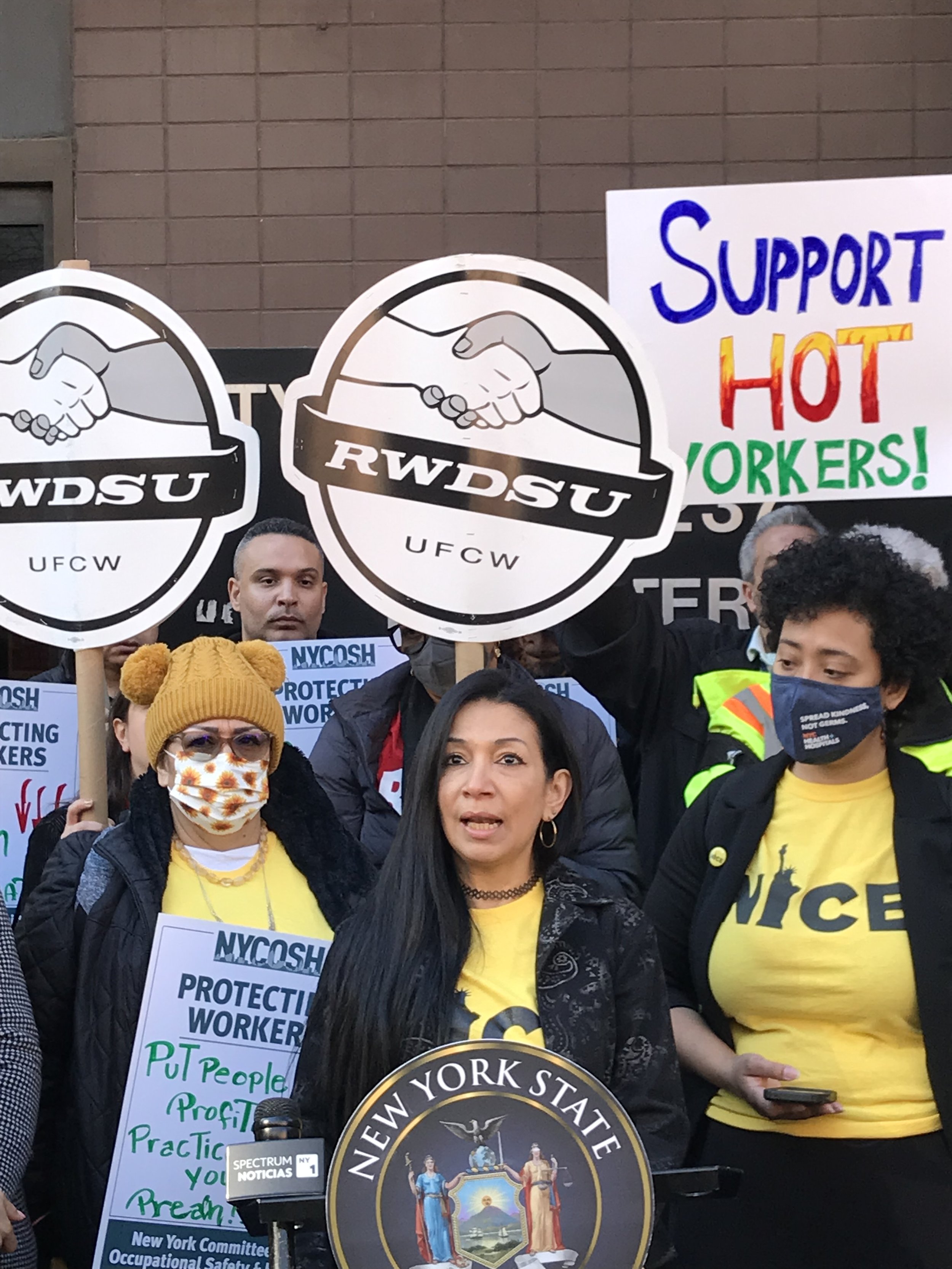Will New York Protect Working People From Freezing Cold & Stifling Heat?
“I have suffered, along with my coworkers, freezing in winter and being dehydrated in summer.” — Elizabeth Arias, New Immigrant Community Empowerment. Photos by Steve Wishnia
By Steve Wishnia
State Sen. Jessica Ramos (D-Queens) and Assemblymember Latoya Joyner (D-Bronx), the chairs of the labor committees in their houses of the Legislature, have introduced a bill to require employers to take measures to protect their workers against extreme heat and cold.
“We have workers in 100-degree heat in UPS trucks, and workers upstate in freezing-cold temperatures,” Charlene Obernauer, executive director of the New York Council on Occupational Safety and Health, told Work-Bites as about 100 people gathered for a rally supporting the bill in front of Teamsters Local 237 headquarters on West 14th Street Feb. 10.
The bill, she said, would require employers to provide personal protective equipment, such as gloves, for workers in extreme heat or cold, along with rest breaks and “acclimatization” periods for them to get used to the temperatures.
“We can’t trust employers to address these conditions on their own, out of the goodness of their hearts,” Sen. Ramos told the rally.
Blizzards, Assemblymember Joyner added, are “out of our control,” but providing break time is “within our control.”
The federal Occupational Safety and Health Act does not set specific standards for protection against extreme temperatures, Ramos’s office said. Several states have set their own heat standards, and in Texas, the cities of Austin and Dallas require 10-minute water breaks for construction workers, surviving an attempt to have state law pre-empt them in 2021. The proposed New York State bill would be the first in the nation to protect workers from both extreme heat and cold, according to Ramos’s office.
In 2018 more than 400 workers in New York State suffered ice, sleet, and snow injuries, one-seventh of the national total.
The measure, the Temperature Extreme Mitigation Program, would cover workers in agriculture, construction, landscaping, commercial shipping, food service, and warehousing when temperatures on the job are above 80° or below 60°F. In hot conditions, they would have to get a 10-minute break in the shade or a cool room every two hours, and have access to at least a quart of water every hour. Vehicles where workers spend at least 60 minutes a day would have to have air-conditioning.
UPS driver Chris Cappadonna, a Teamsters Local 804 member, told the rally that on a blazing-hot day last August where his route had 170 stops, when he opened the back door to his truck, he felt a blast of heat “like opening the oven to check on your frozen pizza. Now imagine working in there.”
He said he felt light-headed and clammy. Two sanitation workers saw him and let him sit in their air-conditioned truck, and he called his brother to take him to an urgent-care center. They sent him to the emergency room, where he was diagnosed with heat exhaustion.
In cold conditions, employers would have to supply adequate heat, breaks in warm places, and gear such as gloves, coats, and clothing with heating features.
“We are talking about basic standards,” like landlords having to provide heat and hot water, said Local 804 business agent Dave Loobie, who represents UPS indoor workers.
“It’s not acceptable that UPS trucks are in a building where the pipes freeze,” Local 804 President Vincent Perrone told the rally. “It’s like an ice-skating rink in there.”
The company’s chief executive, he added, recently told shareholders that while the Earth is getting warmer, management wouldn’t negotiate how to handle that, it would do it “organically.”
Many injuries from heat or cold aren’t reported, Loobie told Work-Bites, as workers just go home when they’re feeling sick from working in those temperatures.
According to federal Bureau of Labor Statistics figures cited in the bill, in 2018 more than 400 workers in New York State suffered ice, sleet, and snow injuries, one-seventh of the national total. There were 50 workers who missed more than a month of work because of injuries were related to exposure to environmental cold.
The proposed legislation would also protect part-time workers, independent contractors, day laborers, farmworkers, temporary and seasonal workers, and those hired through staffing agencies, contractors, or subcontractors, without regard to their immigration status. It does not yet have any cosponsors in either house. Ramos said she hoped to get it passed this session.
“I have suffered, along with my coworkers, freezing in winter and being dehydrated in summer,” construction worker Elizabeth Arias, a member of New Immigrant Community Empowerment, told the rally in Spanish. “We need to be heard by legislators.”
Chris Cappadonna told Work-Bites after the rally that he brings his own water and a cooler full of ice on the job, and also buys drinks at delis where it’s easy to park his truck.
“Passing this bill would be great,” he says. “Not just for UPS drivers, but for anyone who drives a truck or does physical labor. You’ve got to take care of the people who are making the money for you.”


